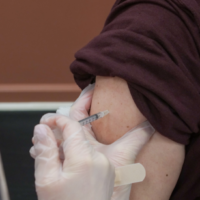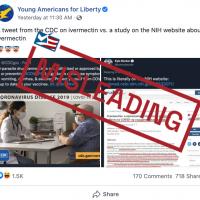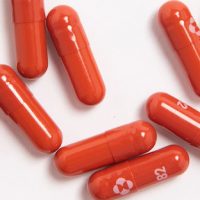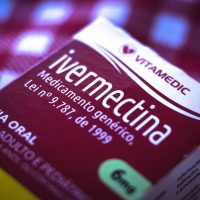Before we ring in 2023, we look back at the most popular articles that we posted to our website in 2022.
Issues: ivermectin
FDA Did Not Change Position on Ivermectin Use, Contrary to Online Claims
In response to a civil suit, lawyers for the Food and Drug Administration described the agency’s warnings about the unapproved use of ivermectin to treat COVID-19 as “recommendations.” Although that description doesn’t reveal new information, some conservative outlets have falsely claimed it’s an “outrageous” revelation and a change in the FDA’s position.
Clinical Trials Show Ivermectin Does Not Benefit COVID-19 Patients, Contrary to Social Media Claims
Evidence Still Lacking to Support Ivermectin as Treatment for COVID-19
Facebook Post Misleads on NIH’s Position on Ivermectin
The National Institutes of Health has not recommended and the Food and Drug Administration has not approved ivermectin as a COVID-19 treatment. But a Facebook post misleadingly implies that an article published on the NIH website is an endorsement of the drug to treat COVID-19. The NIH and FDA have said more clinical studies are needed.
Social Media Posts Repeat Inaccurate Reporting on Ivermectin and Omicron
A Japanese company found that the antiparasitic drug ivermectin showed an “antiviral effect” against the omicron variant in a lab setting. Reuters has corrected a story in which it “misstated” that the drug was effective in a phase 3 clinical trial with human subjects. Some social media users have repeated Reuters’ reporting error but have not repeated the correction.
Japan Continues to Use Vaccines, Not Ivermectin, to Fight COVID-19
More than 70% of Japan’s population has received the COVID-19 vaccines, and the government is moving ahead with a booster shot in December. But a conservative radio host in the U.S. falsely claimed, “Japan drops vax rollout, goes to Ivermectin.” Japan hasn’t stopped its vaccine program and hasn’t approved ivermectin as a COVID-19 treatment.
Merck, Pfizer COVID-19 Antivirals Different From Ivermectin
Merck and Pfizer are each developing a new oral antiviral drug that might prevent or treat COVID-19. The pills are very different from the antiparasitic medication ivermectin, contrary to claims online that they are “suspiciously similar” or that the companies are “repackaging” ivermectin in a ploy to increase profits.
Posts Spread Dubious Claim About Ivermectin and Male Fertility
The Food and Drug Administration says male infertility is not a known side effect of the antiparasitic medication ivermectin. Dubious claims that the drug sterilizes 85% of male users were incorrectly attributed to a questionable 2011 study of the drug’s effect on a small sample of Nigerian men with onchocerciasis, a tropical disease also known as “river blindness.”
Social Media Post on Use of Ivermectin for Refugees Lacks Context
The Centers for Disease Control and Prevention recommends the use of ivermectin as a treatment for arriving refugees to treat parasitic infections. But a social media post by Dr. Simone Gold, a proponent of ivermectin as a treatment for COVID-19, references the CDC guidance without accurately explaining the reason why refugees are given the drug. The CDC has warned against using ivermectin to prevent or treat COVID-19.









